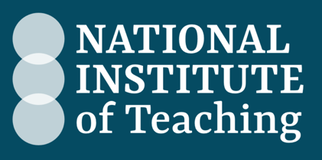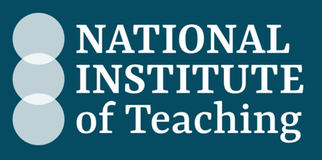|
3/1/2024 0 Comments SWIFT Collaborates with the National Institute of Teaching on a Research ProjectWe are pleased to start this new year collaborating with the National Institute of Teaching (NIoT) on a research project.
The National Institute of Teaching (NIoT) aims to root their research and programmes in schools. They seek to design research that addresses areas that teachers and leaders care most about and feeds directly back into programmes to strengthen training and development. SWIFT aims to create high-quality opportunities for staff to learn, develop and connect so that all children, especially the disadvantaged, achieve the best educational outcomes. This year, the NIoT and SWIFT are collaborating on a research project to learn more about the Early Career Framework (ECF) programme delivery, and how the ECF can be designed for schools in rural and coastal communities. Purpose of the Study Early evaluations of the ECF have shown that Early Career Teachers (ECTs) hugely value the support from Mentors. However, workload and balancing responsibilities for ECT Mentors remains a challenge (DfE, 2023). In addition, some schools in rural and coastal communities are reporting particular challenges in delivering aspects of the ECF. For example, schools with small staff bodies may find it more challenging to provide adequate time for Mentors off-timetable to meet the demands of the role. For some schools, the distance required for ECTs and Mentors to travel to in-person training may require greater time outside of school. However, little is known across the country, and more evidence is needed in order to understand the types of approaches that might be needed to deliver the ECF in different geographic locations. The Aim of the Study The intention is to support ECF design for schools in rural and coastal communities, with an intention to build towards a larger study to pilot promising strategies in order to:
How will the findings be used? This research will be used to tailor the NIoT’s own ECF design to be suited to different geographic locations, and to make sure that schools, ECTs, ECT Mentors and school leaders have the support they need to deliver the ECF. There is also the intention to build towards a larger study to pilot promising strategies. The NIoT will also use the research to make recommendations to the sector, and for awareness-raising and advocacy to shape future policy revisions. How can I get involved? If this study sounds like something you are interested in, we would like to hear from you! The study will run from January to October 2024 and will involve a national survey, and qualitative research with selected schools in the North East and South West regions of England. Research Interviews The NIoT are currently looking for schools to take part in the qualitative research strand between March to May 2024 and would like to interview six to ten Early Career Teachers (ECTs), ECT Mentors, Induction Tutors and/School Leaders across a range of schools in the North East and South West England. Interviews will last for about 45 minutes, and a member of the NIoT Team will come to your school in person at a time that is convenient to you. There is no obligation for any other member of staff in your school to take part, if only one staff member is interested and each individual who participates will receive a £10 book token as a thank you for their time. Advisory Group In addition, they are also looking for a small number of teachers and leaders to participate in an advisory group for this study. This will involve two to three sessions throughout the year, held remotely and at a time agreed with the group, depending on availability. The group will guide the study team in making sure the findings are useful, and will share them in the most impactful way. We welcome your interest in participating in the research or joining the advisory group. By the National Institute of Teaching and SWIFT Team
0 Comments
11/10/2023 0 Comments Interview with Jenny Sutton, Regional Principal, South and West – National Institute of Teaching “I genuinely love working with our Associate Colleges because [THEY] all want to build a really strong partnership with us, that genuinely ensures the programmes we develop and deliver together are of maximum benefit for teachers and leaders.” Jenny Sutton is the National Institute of Teaching's founding Regional Principal for the South and West and was previously a Head of School Partnerships at Teach First leading on their relationships with Teaching School Hubs as Delivery Partners for the Early Career Framework (ECF) and Reformed National Professional Qualifications (NPQs), having previously spent seven years as Teach First's South West Regional Director, founding their work in this region. Prior to this role, Jenny spent ten years as a Teacher of English and Drama, Head of Faculty and Assistant Head in two large secondary schools in Islington and Hackney. Jenny is an 09 cohort member of Future Leaders and Teach First Ambassador. 1. How do you anticipate the work of the Associate Colleges/Teaching School Hubs in working with the National Institute of Teaching will benefit their schools?
The National Institute of Teaching offers genuinely schools-led programmes. We are led by the School Led Development Trust, an organisation set up by four leading School Multi Academy Trusts: the Harris Federation, Star Academies, Oasis Community Learning and Outwood Grange Academies Trust. They are responsible for 188 primary, secondary and Post-16 schools and colleges and educate 100,000+ children in communities ranging from Southampton to Middlesbrough and from Blackpool to Battersea. This provides a very rich national network for the National Institute of Teaching to tap into when it comes to the delivery and design of our programmes. For example, our suite of National Professional Qualifications (NPQs) all provide national Masterclasses led by the best experts from that national network. This provides new insights for schools in Associate Colleges to tap into, alongside the regionally-run aspects of the programme, which are grounded in local context e.g. termly in-person conferences. We also host Virtual School Visits for our NPQ programme members in schools in our founding MATs, which similarly provide a window into areas of good practice nationally. The focus of these is driven by our research and feedback from our programme members about their needs. For example, for the NPQ in Leading Teacher Development, if schools were struggling in getting early teachers to buy into practice-based learning, the National Institute of Teaching could share a virtual visit of a school that has successfully embedded this into their school and look at some of the key factors and principles underpinning successful implementation. It is vital for us that all our delivery is facilitated by those working in schools and leading this work day in, day out. We also have a rich network of national experts outside of our four founding Trusts; providing speakers that more isolated schools and communities might not necessarily be able to hear from or might have to travel to London to hear from. For example, programme members on our ECF programme are able to attend a series of Masterclasses with experts, such as Tom Bennett leading sessions on behaviour. We provide these national webinars free of charge for colleagues who are on a National Institute of Teaching programme. Thirdly, we have a strong research arm to our work and are continually being commissioned to deliver research in key areas of development for the educational sector. For example, we are working in partnership on a piece of research in how artificial intelligence (AI) could be used in education and we are interested in how AI could be used in professional development to increase efficiency and teacher well-being, recognising the potential challenges of achieving a good work-life balance in education. We are also keen to look at research in areas of particular interest for our Associate Colleges. For example, we are currently working on a piece of research with SWIFT about how the Early Career Framework (ECF) is running in small schools, particularly small primary schools. We also include the experience and feedback from our Associate Colleges when considering future policy developments. Finally, we are working towards becoming a university that is dedicated to the professional development of teachers and leaders and this will hopefully provide exciting opportunities for our Associate Colleges. 2. What do you believe is the greatest challenge for the National Institute of Teaching? I think the greatest challenge for the National Institute of Teaching is the pace of the work - going from the design, to implementation to delivery stage in a short space of time in a relatively small organisation across several programmes. In year one, we are delivering initial teacher training for 500+ trainees and delivering the ECF to thousands of programme members and delivering the full suite of NPQs, so there's lots of piloting and learning in a short space of time. We have also recently been successful in our bid to be accredited to deliver the new NPQ in Leading Primary Maths. 3. What do you hope to achieve personally from working with Associate Colleges? I genuinely love working with our Associate Colleges because all our Associate Colleges want to build a really strong partnership with us, that genuinely ensures the programmes we develop and deliver together are of maximum benefit for teachers and leaders. So, if colleagues from SWIFT schools take part in these programmes, they have to feel like it was a good use of their time...that is fundamental - we both understand that time is precious for teachers and school leaders, so are both motivated by impact and efficiency. We thank Jenny for her insights into the work of the National Institute of Teaching and SWIFT is pleased to be supporting their work as two of the Associate Colleges. Interview by Jude Owens, PA to the Executive Team and Governance “The NIoT is going to revolutionise the way teachers receive training in this country, with cutting edge research alongside training delivered by national experts.” The Rt Hon. Nadhim Zahawi MP, Secretary of State for Education
At the end of last term, the Department for Education announced that the School Led Development Trust had been awarded the contract to deliver the new National Institute of Teaching (NIoT). The National Institute of Teaching is a new, ambitious, Government-funded body that sets out to transform teacher development. It is led by a school-led partnership of four Multi-Academy Trusts (MATs) with outstanding track records in school-led university-accredited teacher development: Harris Federation, Oasis Community Learning, Outwood Grange Academies Trust and Star Academies. Each of the founding MATs will lead one of the four Regional Campuses, and each campus is supported by three Associate Colleges. We are delighted that Education South West (ESW) has been appointed as one of the founding Associate Colleges and will be working directly with Oasis Community Learning. As an Associate College, ESW will be responsible for supporting the Regional Campus to ensure scale, reach cold spots in current provision and deliver the NIoT training programmes. This is exciting news for the SWIFT partnership and SWIFT's collective expertise and experience will play a key role in the design and delivery of the NIoT programmes within the region and evolve and build on our Teaching School Hub responsibilities within Devon, Plymouth and Torbay. So, what is the National Institute of Teaching?
What opportunities does the NIoT create for the SWIFT partnership?
These are very early days, so there is much to develop our thinking around and we look forward to future developments of the National Institute of Teaching. |
SWIFT News
|
SPONSORED BY
Join us, be a part of our SWIFT community |
© COPYRIGHT 2022 SOUTH WEST INSTITUTE FOR TEACHING SWIFT. ALL RIGHTS RESERVED | Website by brightblueC
VIEW OUR PRIVACY NOTICES | VIEW OUR COURSE T&CS
VIEW OUR PRIVACY NOTICES | VIEW OUR COURSE T&CS




 RSS Feed
RSS Feed





